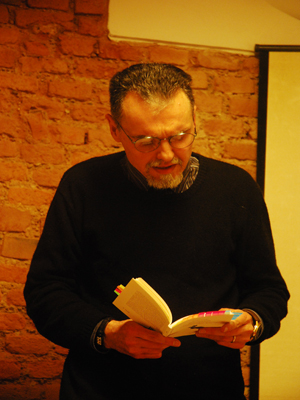|
|---|
|
|---|
“.... out of spite of proliferating ...” |
|---|
 |
Biography: Sergio Gallo was born in Cuneo in 1968 and lives in Savigliano (CN) since 1982. He graduated in Pharmacy at the University of Turin and works as a pharmacy assistant. He published: Thoughts of love and disaster, Tipografia Saviglianese 1991, The carousel of Venus, Mario Astegiano Editore 2003, Songs of the lost love, Puntoacapo, Novi Ligure 2010, Pharmakon, Puntocapo, Pasturana 2014; Ravens with a muzzle, Lieto Colle 2017; Harebeak - poems on the mountain 2006-2018, Puntocapo, Pasturana 2018. His verses have appeared on The Hourglass, Pages, The Voices of the Moon, The Signal and in several anthologies, including: The mafia and beyond the nations, edited by by Gianmario Lucini, Edizioni CFR 2011; Poetry in Piedmont and Valle D'Aosta, curated by Emanuele Spano and Davide Ferreri, Puntoacapo Edizioni 2012; Chronicles From Rapa Nui, curated by Gianmario Lucini, Edizioni CFR 2013; the Almanacco Point n.5, puntocapo 2015; Bankruptcy curated by Ivan Pozzoni, Limina Mentis 2016; the American anthology International Authors, Emanations 2 + 2 = 5, by Carter Kaplan, Brookline, Massachusetts, 2015; The Flower of Italian poetry, Tomo II - I contemporanei, Puntoacapo 2016; Ten years - Vol I, curated by Ivan Pozzoni, Limina Mentis 2017; We, ghosts, by Ivan Pozzoni, Limina Mentis 2018. They wrote about him, among others: Mauro Ferrari, Ivan Fedeli, Alessandra Paganardi, Beppe Mariano, Alfredo Rienzi, Cristina Raddavero. |
|---|
| The comments are by CRISTINA RADDAVERO |
|---|
Sergio Gallo: "Approdi - Landing" Arsenio Edizioni
E di te che saprò? Le tue apparenze L’ultima opera letteraria del poeta Sergio Gallo, Approdi/Landings (trattasi di due poemetti dall’ambientazione squisitamente “spaziale”) si pone come un punto di svolta e nello stesso tempo una marcatura della penna di chi, come il Nostro, sente il verso fortemente avvitato sul rapporto di fondo natura/linguaggio, ma potrebbe valere l’inverso, linguaggio/natura senza che né l’una dimensione, né l’altra ricevano più o meno valenza nell’impianto comunicativo del poeta. Oceans, strainers of tears Gli oceani colatoi di lacrime
[The Voyager Golden Record] [Voyager Golden Record] [Black hole] [Buco nero]
|
Candida albicans
|
Sergio Gallo with the unpublished Candida albicans becomes a poet of "necessity" by making unexpected connections between the verse and the microscopic world of saccharomyces. It touches the never lost knots of the valence of the poien according to its dynamics and its very personal strategies combining techno and imaginative: irreverent cohabitations that generate real lyric acts. At the same time, one gets the impression of biting into the inventio, the first step towards the development of an oration, in the tenacity with which the organization of the topic to be dealt with is set. Gallo is then orator to the extent that he forms and articulates his argument, and the phase of "invention" presents itself as a crucial moment for the poet because here he is the first step in the limping verse. And in this lameness the watchful and witty eye of the poet turns and fills, transforming the micro into macro, the detail in size. The squaring of the circle remains impossible (nor is anyone accustomed to it), but the treasure of the warrior mushrooms is destined to open further scenarios that bring the invisible world to the naked eye, for which it is necessary to find consonant lenses. |
| From hare beak Feet section VIII From season to season of fracture in fracture of erosion in erosion, expect to be fulfilled of our destiny. A little alchemists, a little anchorites, as long as it is granted, like the mollusk of the oyster obstinately to the rocks remain anchored. And the Devil's chair between- Cloto, Lachesis, Atropo - with the years to see change in the throne of Ananke. On your feet of the mountains still being able to return. |
Even the gods could do nothing against Fate.And in that "waiting for the fulfillment / of our destiny" (Beak of Hare, section Feet, VIII) we find the first and last point of Sergio Gallo's poetry without concessions to sentimentalism of a distorted romanticism or yielding to the lyric of sensation. The poet's going is a walk on a "necessary" ridge (in the throne of Ananke), a crystalline voice in the stratigraphy of the remote Being fraught with an equally obstinate future in his coming. In the deliberate mixture of science and myth, Gallo today stands as a "devaluating" the use of writing as a sign of trade between men and grafting it onto the imaginary throne of singing to the Earth and to Heaven passing through the phusis that he had so well connoted the birth of Western thought in the Greece of the archaic age. Gallo is, perhaps without knowing it, the son of the "origins", of that garment of knowledge that, unprecedented in history, branches off the logos on its mythical baggage. A "reasoned" poem by virtue of the capacity of human spirits that are much higher because they are focused on continuous research. |
Rib Section Human betrayals: modern cannibalisms, cainismo by eaglets. Where the golden eagle nests I immolate every certainty, every illusion again invoking or Mother Goddess, Your tacit protection. (6) "Sovereign of the winged": reference to the verses of Pindar, Pitica I, v. 13. |
When Telemachus and Antinous in the II book of the Odyssey verbally clash over the dramatic situation that Argo lives in the absence of his king Odysseus, at a certain point Zeus, with a powerful voice, sends two eagles to the young son gathered in the assembly (from above ... flying from the top of the mountain ...). |